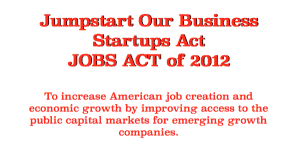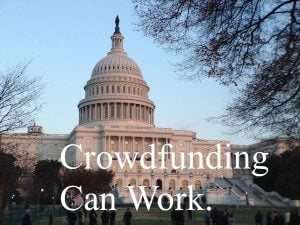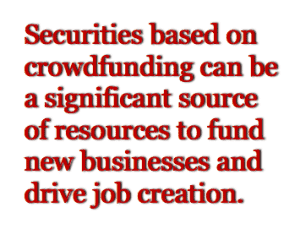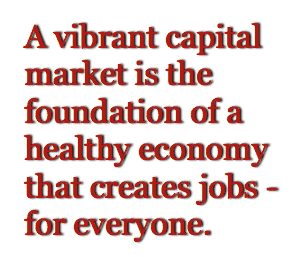 Now that we have seen what real turbulence is with the financial crisis of 2008, fear and panic are drivers of economic behavior. Strengthening the financial markets for America’s small businesses and closing the wealth gap amongst the crowd is a must.
Now that we have seen what real turbulence is with the financial crisis of 2008, fear and panic are drivers of economic behavior. Strengthening the financial markets for America’s small businesses and closing the wealth gap amongst the crowd is a must.
Now is not the time to gesticulate the good intentions embedded in the idea of the Jumpstart Our Business Startups Act (JOBS Act) but now is the time to reform capital formation. The wealth disparity gap globally has expanded wider for the lower to upper middle classes more in the last five years then it has in the past decade. This is not just important in the United States or the European Union, it is also important to recognize that capital formation is a global process.
 The tendency towards ever-increasing social and entitlement spending has occurred disproportionately globally. Much of the rise in the income share of the top one per cent is explainable by a tendency for some wages, such as those of asset managers and chief executives, to track stock prices closely. Over the last decade the challenging economic and market background has led to lower returns across many asset classes, as well as higher than normal volatility especially for shares exposed to growth markets. For many people, the objective of investing is to achieve long-term capital growth with an acceptable risk level. While at the same time small businesses are seeking financing to build products and services, operate and grow their businesses that yield job creation.
The tendency towards ever-increasing social and entitlement spending has occurred disproportionately globally. Much of the rise in the income share of the top one per cent is explainable by a tendency for some wages, such as those of asset managers and chief executives, to track stock prices closely. Over the last decade the challenging economic and market background has led to lower returns across many asset classes, as well as higher than normal volatility especially for shares exposed to growth markets. For many people, the objective of investing is to achieve long-term capital growth with an acceptable risk level. While at the same time small businesses are seeking financing to build products and services, operate and grow their businesses that yield job creation.
JOBS Act, Regulation Crowdfunding
Title III (Regulation Crowdfunding), was created to spur capital formation online for small emerging businesses while fostering job creation. Small enterprising companies create 64 percent of all jobs. Unfortunately, with the current set of final proposed rules, incentives for small businesses to use securities based crowdfunding to raise money has been dramatically lessened.
The reasons behind this challenge is that several of the provisions saddle the entrepreneurs with financial burdens and responsibilities of larger more established businesses while also increasing the risk for Registered Funding Portals. A few examples of the proposed rules which include these issues are;
- Financial Disclosures for raises of $500K or more and the on-going reporting obligation;
- Limitation on Capital Raised; and
- Statutory of Liability for Funding Portals.
With the first set of crowdfunding rules under review and pending, this is the best time for the Commission to create a foundation that will foster a balanced ecosystem that will serve entrepreneurs, funding platforms and investors collectively.
A Disenfranchised Market Place: Women
 Women make up 51% of the world’s population but only 4.2% hold CEO roles at Fortune 500 companies; this equals only 22 women out of 500 companies.
Women make up 51% of the world’s population but only 4.2% hold CEO roles at Fortune 500 companies; this equals only 22 women out of 500 companies.
However, women have tremendous spending and buying power in America today—and it’s growing. Market estimates about their total purchasing prowess varies, ranging anywhere from $5 trillion to $15 trillion annually. And the scope of that spending is notably vast. Fleishman-Hillard Inc. estimates that women will control two-thirds of the consumer wealth in the United States over the next decade and be the beneficiaries of the largest transference of wealth in our country’s history—compelling insight for anyone curious about who’s keeping the U.S. economy going these days.
In addition to handling the bulk of the purchasing decisions for consumer goods in the U.S., they’re also likely to influence or manage many other big ticket purchases—homes, autos, appliances, furniture, etc.—not to mention a large portion of the apparel, groceries and everyday purchases.
According to a survey conducted by the Boston Consulting group in 2013, globally, women control $20 trillion in annual consumer spending (U.S. dollars). In the next five years, it is expected that this number will rise to $28 trillion. This data supports the notion that crowdfund investments could become a $300 billion market if only 1% of consumer spending would get redirected to securities based crowdfunding.
If given a workable set of rules, women are positioned to become a strong segment of the new investor class. Women are also poised to become CEOs of their own businesses; which in turn will create jobs and spur future innovation – but Regulation Crowdfunding must become available and work.
Millennial “ Generation Y”
Generation Y, which is defined by demographers as ranging from ages 18 up to as old as 37 – make up the largest population demographic we have ever seen. Eighty six million strong in the U.S. alone, it is 7 % larger than the baby boom generation. Generation Y makes up 27% of the U.S. population.
 There are few job prospects for the next generation, towering student loans, and what appears to be a bleak future, “Generation Y could keep growing to 88.5 million people by 2020, owing to immigration,” says demographer Peter Francese, an analyst at MetLife Mature Market Institute.
There are few job prospects for the next generation, towering student loans, and what appears to be a bleak future, “Generation Y could keep growing to 88.5 million people by 2020, owing to immigration,” says demographer Peter Francese, an analyst at MetLife Mature Market Institute.
In the coming years, the world economy will need to depend on their economic might and spending power. But for now, Generation Y is financially disenfranchised and discouraged.
For example, across Europe some 20 percent of those under 25 years of age are without a job, in countries harder hit by the economic crisis the rate is above 40 percent. Industries from housing and autos to retailing and financial services could be transformed by this generation’s collective demands and desires.
It is therefore vital to enable this generation to establish themselves in society, to create value and wealth. Alternative securities based on crowdfunding can be a significant source of resources to fund new businesses and drive job creation. It may enable Generation Y, and others on the investing and receiving side, to gain skill sets that increase their employability, drive innovation and create opportunity for our youth.
This would result in much needed economic growth and provide Generation Y with a place in society. Coupled with young people’s doubts about the future of government entitlement programs, this could usher in a new era of saving and a bull market for investment opportunities and wealth across society.
In uncertain economic times why should you consider investing in smaller companies? Large companies offer familiar names and often a reassuringly defensive position to weather unsettled financial conditions. ‘Blue chip’ might convey a feeling of security but even in volatile markets small caps can offer great long-term investment opportunities.
Capital Formation spurs Wealth Creation
Regulation Crowdfunding was created for the people and by the people and it is imperative that the SEC crafts a set of rules that will be understood and adopted by the masses. This will require facilitating educational programs, regulations and incentives for Intermediaries, Issuers and Investors. The ecosystem to support a capital market that is multi-layered will need to be able to support competing and related interests. The markets that succeed in balancing these many interests are the markets that will go the furthest in facilitating capital formation. Efficient markets need to improve the allocation of capital and enhance long-term economic growth. This is an incredible opportunity with the JOBS Act.
 However, the current rules resemble a set of rules that punishes the disenfranchised: small businesses (issuers), funding portals (mainly startups), and investors.
However, the current rules resemble a set of rules that punishes the disenfranchised: small businesses (issuers), funding portals (mainly startups), and investors.
Crowdfunding is an alternative approach to raising finance for a business, project or idea, popularized by “donation” and “rewards” based campaigns in the United States and abroad. Crowdfunding has evolved over the last decade, first in the film and music industries, then in journalism and now in venture and debt finance.
Crowdfunding is unlike traditional investment, in where one relies on large commitments from one or two institutions in a small business in that; (a) crowdfunding enables an entrepreneur to attract a “crowd” of people, who may be linked by social networks or shared interests; (b) and contributes towards an online funding target (campaign) via a registered intermediary (Funding Portal or Broker Dealer); and c) raise up to $1 million per every 12 month calendar period.
 It is believed that, in many cases, the crowdfunding model will be more successful than attempting to source the full investment required from a single individual or organization.
It is believed that, in many cases, the crowdfunding model will be more successful than attempting to source the full investment required from a single individual or organization.
Furthermore, while some investors may be hesitant to invest in an unproven idea, crowdfunding provides an alternative way to source seed capital from a number of backers, accredited and non-accredited, along with friends and family.
As investors move into new markets like crowdfund investments, where historical information may be hard to find, issuers willing to pay dividends might realize that this is one of the best roadmaps available to building capital formation and shareholder confidence, since paying dividends usually telegraph management’s confidence in the future of the company.
Conclusion
 Almost two years have passed since the signing of the JOBS Act, on April 5, 2012 and many of us are wondering when will the final rules for Regulation Crowdfunding go-live?
Almost two years have passed since the signing of the JOBS Act, on April 5, 2012 and many of us are wondering when will the final rules for Regulation Crowdfunding go-live?
Congress provided the framework; now the SEC has the longitude and latitude to implement provisions that will govern a capital market in need of dyer change.
Crowdfunding is set to revolutionize the financial capital markets by combining social media and debt/equity-based financing. Crowdfunding is poised to usher in a new asset class that will change how early stage financing transactions are consummated. In addition, it will create a new investor class that could start the journey to wealth creation for the next generation.
Crowdfunding will become a prevalent way to gain access to capital; it is already happening today and has become big business. Transparency is the core requirement for both the entrepreneur and investors the opportunity to spur job creation and provide access to the public capital markets for small and emerging companies is now.
If the rules become too burdensome, or if incentives become diminished for any party, the ecosystem will operate far below its potential – if at all. Companies will have difficulty reaching new investors, innovation and job creation will remain hampered, and the economy will suffer.
A vibrant capital market is the foundation of a healthy economy that creates jobs – for everyone.
___________________________
 Kim Wales is the founder of Wales Capital and CrowdBureau. She is a sought after thought leader on topics related to the JOBS Act, Crowdfunding and AIFMD. Kim writes for several publications, consults all size organizations and governments and speaker at many global conferences. Wales Capital is a global management consulting firm and trusted advisor. CrowdBureau is a Collective Market Intelligence ratings agency. Both are headquartered in New York, NY.
Kim Wales is the founder of Wales Capital and CrowdBureau. She is a sought after thought leader on topics related to the JOBS Act, Crowdfunding and AIFMD. Kim writes for several publications, consults all size organizations and governments and speaker at many global conferences. Wales Capital is a global management consulting firm and trusted advisor. CrowdBureau is a Collective Market Intelligence ratings agency. Both are headquartered in New York, NY.

